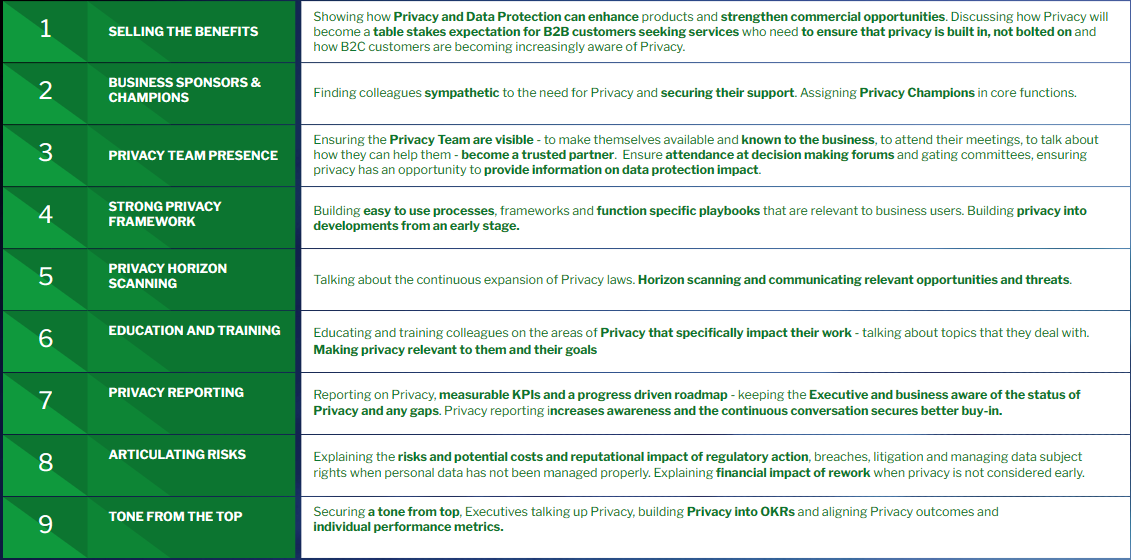How to get buy-in for your Privacy Programme
I am often asked how to get buy-in and sponsorship for a Privacy Programme. Spoiler alert scaremongering about €20 Million fines doesn't really work, so I decided to publish this guide to help Privacy teams get the support they need.

First, it is worth noting that if you are a Data Protection or Privacy Leader applying for roles which involve delivering a Privacy Programme, you should not assume that just because they are hiring for the role, the organisation must be "bought into" the need for Privacy. I know from experience, and extensive discussions with others in the field, that often businesses are completely unware of the scale and breath of activities required to effectively manage Privacy -they assume that by hiring one or two people to deal with it, the Data Protection box will be ticked, without any company-wide effort. The hard truth is that no Programme can run without Executive buy in, Business Sponsors and a commitment to ground level collaboration, because there will always be a need for business execution and Executive accountability.
With this in mind, securing buy in for the Privacy Programme is absolutely pivotal and, I am afraid to say, there is no silver-bullet or single activity that will secure the company-wide support required to effectively deliver Privacy and Data Protection.
How you approach this will very much depend on the maturity of the organisation, their risk appetite and overall culture. It is important to have sensitivity to these factors, because they can make or break your ability to get buy-in.
I recommend using a multi-faceted approach, using a combinations of techniques and approaches, firing from different angles. The rest of this article outlines the methods I use and why I find them successful.
Privacy Programme Buy-In Techniques
- Selling the benefits. Selling the benefits is my favourite technique. There are many positives to Privacy and Data Protection - I like to talk about how data protection and privacy can enhance products and services, how it can improve consumer trust. Many customers in the B2B world are starting to expect Privacy and Data Protection as table stakes - they want to see it taken care of - built in, not bolted on - this feature strengthens commercial opportunities leading to a significant return on investment. When colleagues understand the benefits, buy-in comes naturally.
- Business Sponsors and Privacy Champions. Find colleagues that are sympathetic to the need for Privacy and Data Protection and secure their support. There are many of these in the business, you just have to find them, even in unlikely places! Colleagues I have found who can be real friends to the Privacy team are Security professionals because, well, they just get it! Product and Tech teams because they (in their own words) don't want to develop a product that creates the next Privacy scandal. Commercial Sales and B2B Development teams, because they love anything that can support their sales pitch 😁. Legal, risk and compliance teams because it is in their DNA. Marketing teams too, maybe sometimes a bit reluctantly, but they really understand the need for following global marketing laws which go hand in hand with Privacy. Once you have departments championing the Programme, it is easier to get executive buy in. Privacy Champions are another amazing resource - a team of people across the business who you upskill - they become your eyes and ears and inevitably great voice pieces for your cause (shout out and thank you to the great Privacy Champions I have worked with).
- Privacy Team Presence. Make sure your Privacy Team is visible to the business and stakeholders, even if you are remote. Attend meetings, townhalls, talk about how Privacy can help and become their trusted partner. Make sure the Privacy Team has a presence in Senior Leadership meetings, strategic planning and decision making forums. When colleagues liaise frequently with Privacy teams, they start to understand the whys, regularly hearing feedback about Privacy trains people to think about it more and gives you the buy-in you need.
- Strong Privacy Framework. Build a strong framework for your colleagues to use - clear policies, processes, function specific playbooks. Make it easy for them to build privacy into their work and be easy to do business with. People will automatically buy into something they can understand, more than something that confuses them.
- Privacy Horizon Scanning. Make sure you are horizon scanning, this helps you keep colleagues updated on the latest Privacy developments, opportunities and threats. Being able to translate upcoming developments into strategic commercial opportunities has really strengthened my colleagues buy in for privacy and even, dare I say it, created a bit of a buzz at times. 😎
- Education and Training. Education and training are absolutely core to getting buy-in. Not just GDPR training modules, I mean talking to colleagues about Privacy matters that impact them and their products or services. Making Privacy relevant to their goals always makes buy-in easier.
- Privacy Reporting. People underestimate the importance of reporting on Privacy. Of course it is required to ensure the Controller's accountability, but it is also a really effective tool for buy-in. Giving Exec teams and Stakeholders clear key performance indicators, and reporting at a regular cadence, keeps Privacy and Data Protection at the forefront of people's minds, because it demonstrates the status of Privacy and often shows the scale of activities. Knowledge helps buy-in.
- Articulating Risks. Now this is really important, but it has to be balanced, the biggest turn off is excessive scaremongering combined with lack of pragmatism. Do talk to colleagues about risks relevant to them, but always accompany them by solutions and options that take into account their risk appetite. Appreciate that businesses might want to accept some risks and be pragmatic, this collaboration will ensure better buy-in.
- Tone From The Top. This one isn't always possible, but it is a great winner when Executives talk up Privacy and really embed it in their strategy. Buy-in is almost guaranteed when Privacy is built into OKRs and Privacy outcomes are aligned with individual performance metrics. This kind of tone from the top means that people don't get rewarded for launching great initiatives if they create Privacy risks, which have not been accepted, and encourages Privacy from the ground up.
These techniques combined translate into a set of tools, relationships, governance and commercial benefits that together, used selectively, will place buy-in efforts on a strong footing.
I hope they are helpful to your Privacy Programme. Let me know if they work and if there is anything I have missed.
Good luck with your Privacy Programme! Please get in touch if you need any support.
#privacy #dataprotection #privacyprogramme #gdpr #ccpa #privacyprogramme

hello@article5consulting.com
article5consulting.com


